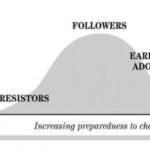
I’ve just finished re-reading Jim Collins’s book Good to Great. Even though it is a business book and was written over 20 years ago, its applications for churches and other ministries today are still worth chewing on. I also found an article by Marshall Shelley on this book which I will refer to in the blog.
Before Good to Great, Collins wrote Built to Last that brought the concept of BHAGs – “Big Hairy Audacious Goals” – onto the agendas of countless planning meetings I led at the time. In an all-too-rare accomplishment for an author, this sequel is better than the original.
While Built to Last documented the things that help a strong organisation endure, Good to Great describes what it takes to transform a mediocre organisation into one that’s truly outstanding.
One surprising thing is the NOT significant factors that are highlighted. The research debunks, for instance, the value of the celebrity superstar Senior Leader. The leaders of “good to great” organisations weren’t charismatic media darlings; instead they demonstrated a combination of characteristics that Christians would consider patently biblical. Collins’s description of “Level 5” leaders (those who build long-term greatness) fit with the corresponding biblical concepts. For instance …
“Level 5 leaders embody a paradoxical mix of personal humility and professional will. They are ambitious, to be sure, but ambitious first and foremost for the organisation, not themselves.” (Sounds reminiscent of “Seek ye first the kingdom of God….”)
“Level 5 leaders set up their successors for even greater success in the next generation, whereas egocentric Level 4 leaders often achieve personal success but set up their successors for failure. (Echoes of Jesus and the way He worked with His disciples).
“Level 5 leaders display a workmanlike diligence – more plough horse than show horse. (Jesus said, “No one who puts his hand to the plough and looks back is fit for service in the kingdom of God.”)
Later in the book, a whole chapter is spent on “the Hedgehog concept,” which is basically clarifying what you are positioned to do better than anyone else in the world. The biblical concepts of spiritual gifts and divine calling aren’t cited, but every Christian can find them between the lines.
Perhaps the most significant effect of the book, however, is the encouragement it offers to normal organisations, even with a history of mediocrity, that they can do better and have a lasting impact. And this is usually accomplished by outwardly unremarkable people who work with personal humility but great determination, over time, by (to put it in Christian jargon) discerning their unique calling as a local Body and continually making mid-course corrections that make a difference in the end.
Related Resources



Comment here